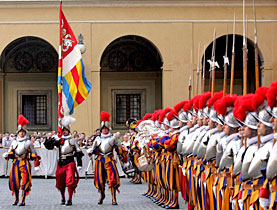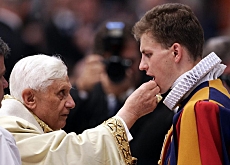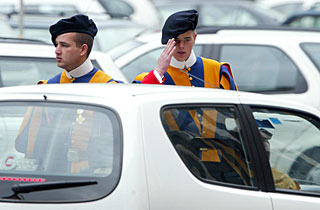From police chief to protector of the pope

A 36-year-old police chief from central Switzerland was thrust into the limelight this week when he was named the next commandant of the Vatican's Swiss Guard.
Daniel Anrig, who will take over in December, hopes to make his own contribution to keeping the venerable institution up-to-date, he tells swissinfo.ch in an interview.
The Swiss Guards with their colourful antiquated uniforms have been serving pontiffs for more than 500 years. Anrig says the Guard faces internal as well as external challenges but its overriding duty is to protect Pope Benedict XVI.
This is no easy task with the pontiff making regular public appearances and travelling extensively. Last year, a German man jumped a security barrier in St Peter’s Square at a crowded general audience with the pope, reviving the debate about security.
Vatican and Italian police collaborate with the Swiss Guard in protecting the pontiff. Maintaining a smooth working relationship with them is a priority for police commander Anrig.
Also a captain in the Swiss army, Anrig will hold colonel’s rank in the Swiss Guard. He is replacing Colonel Elmar Mäder, an attorney and army veteran, who has held office since 2002.
According to Mäder, Swiss Guards are united by a certain taste for adventure and a spirit of camaraderie, “learning the trade of guaranteeing security, deepening their own faith”. Anrig recalls his two-year stint in the Guards before he started studying law as a defining life experience.
swissinfo: Is it fair to say that the Swiss Guard is more decorative than a serious army?
Daniel Anrig: The Swiss Guard has different duties. It is of course a guard of honour, which means it performs ceremonial tasks. Besides that there are other important duties when the Guard is in the public eye, for instance guard service guaranteeing security at the entrances to the Vatican State and in the Apostolic Palace [pope’s official residence] and security at masses and other events.
But the most important duty is as house police, in other words being responsible for the Apostolic Palace and the immediate safety of the Holy Father. The ceremonial duties are clearly the most visible to the outside world but not the most important work that the guards have to do.
swissinfo: Tradition is all-important to the Swiss Guard but in what sense is it modern?
D.A.: The Swiss Guard has been around for more than 500 years and has been through certain phases and built up many traditions in that time. It is clear that an institution of this age constantly has to be developed and modernised to keep up with the times and circumstances.
I trust that the current Swiss Guard has a good level of professionalism and I hope in my tenure that I can make my own contribution to keep the Guard up to date, despite the many traditions.
swissinfo: What are the main challenges of being Commandant?
D.A.: There are certainly challenges, both internally and externally. On the one hand we have challenges in working with our partners to generate and guarantee security for the pope. There are also certainly challenges in the internal operation of the Guard, ensuring that it is led is such a way that all its different duties are well managed under one roof.
swissinfo: Where does the main security threat to the pope come from?
D.A.: The pope through his many public appearances is continually exposed to a certain level of danger and risk. I think his public appearances above all are a great challenge for all those who are responsible for his security.
swissinfo: Why were you interested in this job?
D.A.: I served in the Vatican from 1992 to 1994 and the Swiss Guard has always had a special place in my heart. Now that Commandant Elmar Mäder is resigning this question resurfaced for me.
For me it’s open how long I will serve.
swissinfo: What memories do you have of your time as a Swiss Guard?
D.A.: I have very many positive memories from my time in the Swiss Guard. Those were formative years where I learned a great deal and have benefitted from the experience since then as much in my private life as in my professional life.
swissinfo: Can you see a day when women will also be able to join the Swiss Guard?
D.A.: I’m not yet familiar with the exact wording of the regulations on the participation of women. But as Commandant one has to be always open to new questions including those relating to recruitment.
swissinfo: Are you looking forward to living in the Vatican?
D.A.: My family and I are very happy with our life in Glarus so it’s not that we want to leave but we do know Rome and the Vatican well. It’s clear that the living conditions are special there and certainly attractive.
There are currently 110 Swiss Guards on duty at the Vatican, where they must serve at least two years.
Guard recruits must be Roman Catholic Swiss nationals, 19-30 years of age, single, high school graduates and at least 174cm tall. They must have completed Swiss military service.
Guards on duty carry lances and either a halberd or lance, but are also armed with pepper spray, tear gas and – depending on the situation – automatic weapons.
They stand guard at papal ceremonies as well as help to protect the pope in collaboration with Vatican and Italian police.
The 1998 killing of Guard commandant Alois Estermann and his wife in a Vatican City apartment tarnished the Guards’ image for a time.
Pope Benedict’s predecessor, John Paul II, was badly wounded when shot by a Turkish gunman in St Peter’s Square during a public audience in 1981.
In 2006, Benedict marked the 500th anniversary of the Swiss Guards by praising them as examples for all young people who want to serve the Church.
Daniel Anrig, who holds degrees in civil and canon law, is currently head of police in canton Glarus in central Switzerland. He will take over from Commandant Elmar Mäder in December.
The 36-year-old new commandant is married to a theologian and has four children. He earlier headed Glarus’s criminal police force, and served as a Swiss Guard in the early 1990s.
He is originally from the canton of St Gallen.

In compliance with the JTI standards
More: SWI swissinfo.ch certified by the Journalism Trust Initiative












You can find an overview of ongoing debates with our journalists here . Please join us!
If you want to start a conversation about a topic raised in this article or want to report factual errors, email us at english@swissinfo.ch.